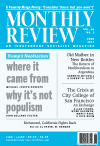
How does it end?
A new poem by Marge Piercy, author of many books of poetry—most recently Made in Detroit. | more…

A new poem by Marge Piercy, author of many books of poetry—most recently Made in Detroit. | more…

We have entered a period of history fraught with danger but also rich with revolutionary potential. It is time to move beyond our illusions that electoral politics and reforms of the capitalist state can achieve the revolutionary changes that we all know are urgently needed. As we begin to reorient our struggles there are important lessons to be learned from the recent history of the global South. | more…

As the smoke clears from the collapse of revolutionary societies from Eurasia to Central America, analysts are searching for the crucial points of weakness that led to the failure of these “socialist experiments.” In Gathering Rage, writer, poet, and activist Margaret Randall describes how two of these revolutions, in Nicaragua and in Cuba, addressed or failed to address a feminist agenda.
Writing as both observer and participant, Randall vividly describes how, in each case, to varying degrees, and in different ways, women’s issues were gradually pushed aside. Combining anecdotes with analysis, she shows how distorted visions of liberation and shortcomings in practice left a legacy that

In the last several years, the left has experienced a series of defeats, and the grip of capital has tightened. The recent reversals in Latin America are a warning. We live in an age where a new era of revolutionary social change, unlike any that came before it, is the only hope—not just for ourselves, but for the chain of human generations. | more…

Argentina has long been plagued by cycles of economic mismanagement, including multiple failed neoliberal experiments. Before his election as president, Mauricio Macri promised resumed growth, an export boom, lower inflation, a smaller budget deficit, and less poverty. Since then, has the new neoliberalism outperformed the old? | more…

U.S. immigration has been the subject of furious debates for decades. On one side, politicians and the media talk about aliens and criminals, with calls to “deport them all.” On the other side, some advocates idealize immigrants and gloss over problems associated with immigration. Dialogue becomes possible when we dig deeper and ask tough questions: Why are people in other countries leaving their homes and coming here? What does it mean to be “illegal”? How do immigration raids, prisons, and border walls impact communities? Who suffers and who profits from our current system—and what would happen if we transformed it? | more…

Admired, followed, criticized, denounced, and rediscovered, “The Development of Underdevelopment” deserves a place among the key documents of postwar radical political economy. More than fifty years on, its ideas still illuminate aspects of recent struggles and shortcomings among left-of-center governments in Latin America. Most importantly, Frank’s work poses a bold postcolonial challenge that has yet to be fully met by Latin American scholars and social movements. | more…

[wcm_nonmember]
[/wcm_nonmember] Although today there are some setbacks in the region, nobody can deny that there is a huge difference between the Latin America that Hugo Chávez inherited and the Latin America he left us. A new revolutionary subject has been created. | more…
—Brett Clark
The major element missing from Latin American politics in recent decades has been, with rare exceptions, the traditional workers’ movement, beaten down by flexibilization, subcontracting, and other neoliberal measures.… The fall of the Berlin Wall and the defeat of Soviet socialism left the parties and social organizations of the left inspired by that model seriously weakened. At the same time, trade unions were hit hard by the weakening of the working class, part of the larger social fragmentation produced by neoliberalism. In that context, it was new social movements, and not the traditional parties and social organizations of the left, that rose to the forefront of the struggle against neoliberalism, in forms that varied widely from one country to another.… The situation in the 1980s and ’90s in Latin America was comparable in some respects to the experience of pre-revolutionary Russia in the early twentieth century.… [M]any of the region’s peoples said “enough” and started mobilizing, first in defensive resistance, then passing to the offensive. As a result, presidential candidates of the left or center-left began to triumph, only to face the following alternative: either embrace the neoliberal model, or advance an alternative project motivated by a logic of solidarity and human development.… [Consequently,] a major debate has emerged over the role that new social movements should adopt in relation to the progressive governments that have inspired hope in many Latin American nations. | more…
Lenin, Bukharin, Stalin, and Trotsky in Russia, as well as Mao, Zhou Enlai, and Den Xiaoping in China, shaped the history of the two great revolutions of the twentieth century. As leaders of revolutionary communist parties and then later as leaders of revolutionary states, they were confronted with the problems faced by a triumphant revolution in countries of peripheral capitalism and forced to “revise”…the theses inherited from the historical Marxism of the Second International.… With the benefit of hindsight, I will indicate here the limitations of their analyses. Lenin and Bukharin considered imperialism to be a new stage (“the highest”) of capitalism associated with the development of monopolies. I question this thesis and contend that historical capitalism has always been imperialist, in the sense that it has led to a polarization between centers and peripheries since its origin (the sixteenth century), which has only increased over the course of its later globalized development. | more…
Medicine and public health have played important roles in imperialism. With the emergence of the United States as an imperial power in the early twentieth century, interlinkages between imperialism, public health, and health institutions were forged through several key mediating institutions. Philanthropic organizations sought to use public health initiatives to address several challenges faced by expanding capitalist enterprises: labor productivity, safety for investors and managers, and the costs of care. From modest origins, international financial institutions and trade agreements eventually morphed into a massive structure of trade rules that have exerted profound effects on public health and health services worldwide. International health organizations have collaborated with corporate interests to protect commerce and trade. In this article we clarify the connections among these mediating institutions and imperialism. | more…
Notifications